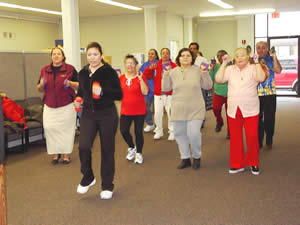Advancing Diabetes Self Management
Holyoke Health Center, Inc.
 230 Maple Street
230 Maple Street
Holyoke, MA 0104
www.hhcinc.org
Holyoke Health Center, Inc. (HHC) is a state licensed
501(c)(3)
organization established in 1970. It is also a federally qualified
community health center and JCAHO accredited.
The HHC
catchment area encompasses the downtown district of Holyoke
that is designated as a Medically Underserved Area and a Health Professional Shortage Area; it is also the poorest area of
the city.
The city of Holyoke has the highest rate of diabetes mortality in
the Commonwealth of Massachusetts. HHC patients share the
burden of this disease and suffer disproportionately. The
diabetes project, Proyecto VidaSaludable, focused on patients in HHC’s current registry of patients with type 2 diabetes. These
patients were 89 percent Latino/Puerto Rican and 100 percent
live at or below the poverty level.
The diabetes project at HHC gave patients with type 2 diabetes
an opportunity to choose from a wide range of programmatic
interventions that were shown to be effective for Latino
patients. The Snack Club provided nutritious, easy-to-prepare
snacks and offered an opportunity for patients to get acquainted
with HHC programs and staff. Patients who had success
managing their diabetes were often invited to the Snack Club to
provide testimonials to inspire and motivate newly diagnosed
patients or those whose diabetes was still not well controlled. The
Breakfast Club fulfilled a need for social and emotional support, and was a venue for effective, hands on
education. Patients benefited
from joining together to eat a nutritious breakfast in a supportive
and educational environment, and they began to establish a
breakfast routine during the eleven-week
session.
Bilingual diabetes education classes were designed to meet the
health literacy needs of patients. Many low literacy teaching
techniques and tools were utilized in the classroom setting.
Individual counseling sessions with a diabetes nurse educator or
nutritionist emphasized strategies based on the readiness of each
patient to change behavior. Patients who completed
Breakfast Club or diabetes education classes participated in a
field trip to local supermarkets to apply what they had learned
about healthy foods. Chronic Disease Self Management Classes
based on the Stanford model were generally offered to patients
after they completed either the diabetes education class or
the Breakfast Club. Patients learned problem-solving skills, practiced
goal setting and action planning and learned new relaxation
techniques.
Promotoras were a critical link between clinical staff and patients.
Promotoras identified, engaged, and motivated patients with type 2
diabetes who had not seen their primary care provider for
routine care in the past four months. The promotoras reached out
to these patients to reconnect them with primary care.
Additionally, promotoras received referrals from primary care
providers and followed up with patients at the health center, by
phone or in patients’ homes, to provide social and emotional
support and education on a variety of diabetes self management
topics. Promotoras were trained in goal setting, problem solving, action planning, communication techniques, health literacy and
general knowledge about diabetes. They were mentors, teachers
and advocates for patients with type 2 diabetes.
HHC’s organizational philosophy led to a culture that
recognizes the importance of a collaborative relationship among
the patient, provider and support staff in order to achieve successful chronic disease self management. HHC anticipated
that this culture will result in long-term,
positive outcomes for
patients with diabetes.
Summary
Key Interventions
- Multiple activities that focus on developing and
maintaining self management skills and that offer choice
to patients:
- Breakfast Club, supermarket tours, diabetes education
classes, weekly Snack Club, exercise classes, individual
consultation with the nurse educator and nutritionist and
chronic disease self management classes
- Use of promotoras to assist, teach, and empower
patients to navigate Holyoke Health Center services and
community resources, teach self management skills and
provide ongoing
follow up
and support
Key Accomplishments
- Improved organizational capacity for self management
support through staff and program development
- Developed a promotora program to implement self
management interventions
- Developed a menu of self management program options
to maximize patient access to intervention activities
- Improved staff knowledge in relation to self management
strategies and techniques
- Increased awareness of the impact of health literacy on
patients’ ability to manage their disease
Lessons Learned
- Individual choice of intervention activities is key to
helping patients stay engaged in self management
- Resources and Supports for Self Management (RSSM)
is a useful framework to guide self management
program development
Grantee Presentations
Program Materials
Program Publications
|

 230 Maple Street
230 Maple Street